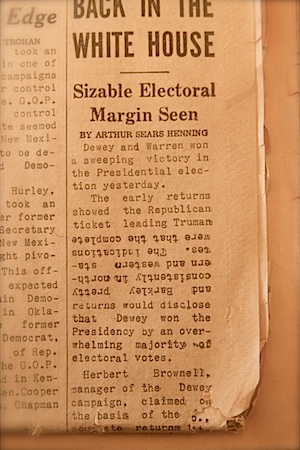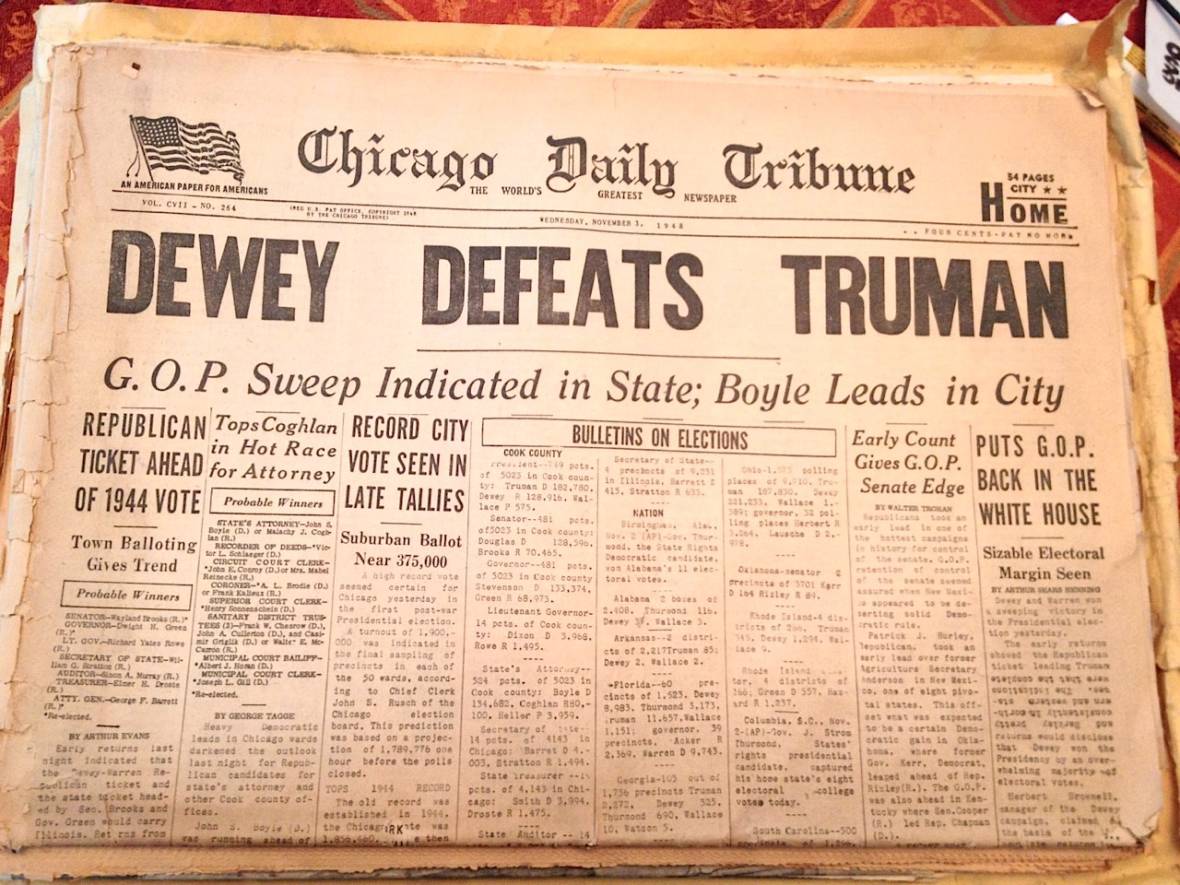(After some research, the explanation appears to be that the paper's typesetters were on strike and that the lines in question were indeed typed, then cut and pasted somehow, then photographed for reproduction on the press. See "Dewey Defeats Truman: The Rarely Told Story of Chicago Tribune's Most Famous Issue" and "The Eleven Editions of the November 3, 1948, Chicago Tribune" -- the latter a fascinating breakdown of what the paper published and when that day.)
Perhaps what I admire most about this imaginative exercise in journalism is the reporting on display in the election mainbar. In perhaps the only story he's remembered for, the Trib's Washington bureau chief, Arthur Sears Henning, declared the outcome of the vote:
"Dewey and Warren won a sweeping victory in the Presidential election yesterday.
"The early returns showed the Republican ticket leading Truman and Barkley pretty consistently in northern and western states. The indications were that the complete returns would disclose that Dewey won the Presidency by an overwhelming majority of electoral votes."
Since the numbers didn't bear out the tale, who or what was the source of that intelligence? Herbert Brownell, Dewey's campaign manager.
Brownell, wrote Henning, "claimed that on the basis of the complete returns 'we will wind up sweeping two-thirds of the states for the Republican ticket.' " There was more:
"As states definitely in the Republican column in the light of the fragmentary returns Brownell named Illinois, Ohio, Indiana, Connecticut, Delaware, Maine, Maryland, New Hampshire, Vermont, and South Dakota. Four years ago the Republicans carried only five of these states.
"'At this moment,' said Brownell, 'the polls have closed in 12 of the 48 states outside the solid south. These states have a total of 120 votes in the electoral college.
"'On the basis of reports which I have been receiving from organization leaders thruout the country, I am confident that the Dewey-Warren ticket has already carried 10 of these 12 states with a total of 101 of the 120 electoral votes.
"'In the other two states--Kentucky and West Virginia--returns are not yet conclusive but the trend to the Dewey-Warren ticket is heartening.' "
Brownell wasn't completely off-base, though Illinois, Ohio, West Virginia and Kentucky all went for Truman. Still, the paper went out on that limb on the basis of 12 states and hearsay about "reports from organizers."
Henning's eventual successor as head of the Tribune Washington bureau, Walter Trohan, was in Chicago that night covering congressional elections for the paper. He recorded an account of parts of his bureau tenure for the Harry S. Truman Library in 1970. He said an election evening phone call with Ohio Sen. Robert Taft, who had lost the Republican nomination to Dewey, led him to believe the Trib's story and banner headline were wrong. About the 72-year-old Henning's insistence that Dewey was winning, Trohan said, "Why he became so stubborn I don't know; I guess age."
Trohan was called on to write a new version of the story for later editions, with Truman the victor. But before that happened, he was asked to appear on a local TV show to discuss the returns:
"...And that night it was terrible, about 10 o'clock, before -- we were still carrying the headline -- I was called to go on TV to discuss the congressional election. And I went up and there was Henning, and there was the wife of the publisher, and some very important people, a dozen people or so. The announcer was a fellow with a charming voice, but no sense, in a very nice pearl-shaped tone, said, 'Well, Walter,' and I had never met him before in my life, 'how is Mr. Dewey going to get along with majority Congress?'
"I said, 'He isn't going to have a majority Congress, the Democrats have won the Congress.'
"He said, 'You mean that Dewey will have to work with a hostile Congress?'
"And I said, 'No, I don't mean anything of the kind. Mr. Dewey ain't going to be there either.' "
But Henning and the Trib were already committed to a different version not only of the story, but of history. Henning's rather brief piece ended with this bit of context under the previously mentioned subhead, "New Deal Repudiated":
"The Republican victory brought to a close the 16 year reign of the New Deal which began in the country's most devastating depression, introduced a collectivist economy, produced a four-term President, embraced a disastrous war and left the nation a 250 billion dollar debt and heritage of foreign policy containing the seeds of another war."


